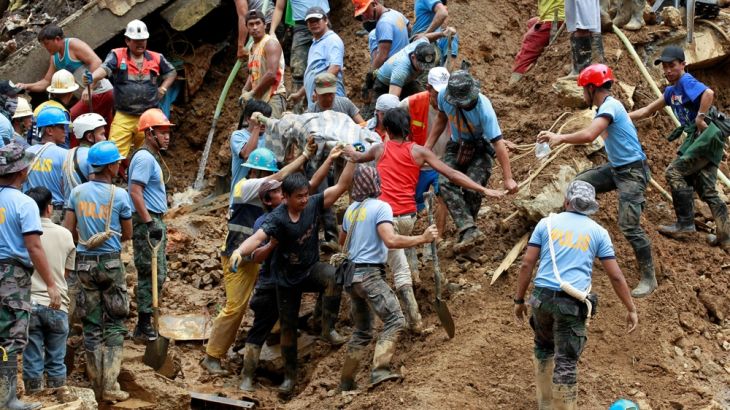Philippines: Rescue efforts under way as Mangkhut toll rises
Dozens of gold miners feared buried in Benguet province landslide, as full extent of typhoon damage is revealed.

Rescue efforts are under way in the northern Philippines as authorities have raised the death toll of Typhoon Mangkhut to 66.
Philippines National Police said that as of Monday, a further 56 people remained missing and 64 were wounded as a result of the world’s strongest storm of this year.
|
|
All but one of the missing are in the Cordillera Administrative Region, which saw a number of landslides.
Philippine police earlier said that the missing, majority of whom are gold miners, were feared to have been trapped when part of a mountain slope collapsed on miners’ barracks in a remote village of Itogon town in Benguet province.
As of Monday evening, at least 11 bodies have been dug out from the site of the landslide.
Victorio Palangdan, mayor of Itogon, said that there is “99 percent” chance that all the missing miners and their families were killed.
Dozens of people sought shelter at the bunkhouse of the miners during the storm, despite warnings it was dangerous.
“They laughed at our policemen,” Palangdan said. “They were resisting when our police tried to pull them away. What can we do?”
The Philippine government on Monday ordered a stop to all illegal mining in six mountainous northern provinces in hopes of preventing more tragedies.
In a press conference, Environmental Secretary Roy Cimatu said the army and police would be deployed to enforce the ban.
Typhoon Mangkhut, locally named Ompong, made landfall on Luzon Island in northern Philippines on Saturday.
On Monday morning, it weakened to a tropical storm after battering Hong Kong and parts of southern China on Sunday.
Chinese state TV on Monday said that four were killed in China as a result of Mangkhut. Millions were evacuated.
Damage revealed slowly
Reporting from Itogon, Al Jazeera’s Jamela Alindogan said the mayor has said he fears the death toll could rise.
“There have been reports that there are pockets of landslides in different parts of this village and we were told that the entire devastation in this community has not yet been grasped,” she said.
“There has been a movement of rescuers doing manual digging and that is because bringing in machines to help with it is very difficult.”
Livelihoods destroyed
Homes and farmlands were left destroyed in rural communities in Luzon’s northeastern Cagayan province, where the typhoon first came to shore.
One of the towns which bore the brunt of the destruction was Baggao.
![Rescue workers clear a road of debris and toppled electric posts as they try to reach Baggao [Ted Aljibe/AFP]](/wp-content/uploads/2018/09/0d651492b0954c469c07838d7392ea28_18.jpeg)
A quarter of people in the region live in poverty and get by on less than two dollars a day.
“There is significant destruction of property and root crops,” General Emmanuel Salamat of the Philippine Marines told Al Jazeera.
Cafe owner Julie Rosales had only her small cafeteria to support her family, but now it is gone.
“It really hurts us, we don’t know where to begin,” she said.
“Everything happened so fast and now my business is gone.”
Many in Baggao defied a forced evacuation order by the government to protect their livelihoods.
“Our house was blown away. We were flooded,” 55-year-old Diday Llorente told the AFP news agency.
“But we did not evacuate because we didn’t want to leave our carabao (water buffalo) and livestock.”